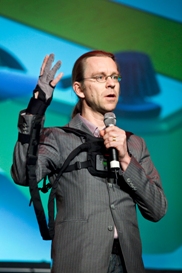
Robohub.org
Robot competitions, challenges and awards
Robotdalen is accepting submissions for their International Innovation Award 2013, aimed at innovators with commercially viable robotics solutions. The Innovation Award replaced the previous Robotdalen Scientific Award in 2012 and offers up to € 12000, including development and manufacturing assistance, for the winners.
The aim of the Robotdalen Scientific Award was to find new and untried methods for robot technology and automation. That goal is still valid but the new award has a stronger emphasis on the innovation and commercialization aspects. [Robotdalen SE]
Competitions, challenges and awards have a great track record for driving technological innovation. Napoleon Bonaparte offered 12,000 francs for a new method of preserving food in 1795, a prize eventually claimed by Nicolas Appert in 1810 after several years of testing the canning process. The Rainhill Trials for steam engines in 1829 offered prize money and business contracts, rewarding entrepreneur inventors.
As well as fostering innovation, competitions respond to socio-economic challenges, inspire collaboration, communication and standardize benchmarks. [Del Pobil 2006]
Robotics has a rich history of competitions and challenges, starting with Alan Turing’s proposed test for artificial intelligence in 1950, which has continued with the Loebner Prize. Other competitions, challenges and awards at the moment include:
The DARPA Robotics Challenge (DRC), has the goal of developing ground robots capable of doing complex tasks in dangerous human environments. With both a software and hardware track, the DRC aims to advance supervised autonomy in perception and decision-making, mounted and dismounted mobility, dexterity, strength, and platform endurance. Success with supervised autonomy, in particular, could allow control of robots by non-expert operators, lower the operator’s workload, and allow effective operation even with low-fidelity (low bandwidth, high latency, intermittent) communications.
In the NASA-WPI Sample Return Challenge, teams will compete for up to $1.5 million in prizes by demonstrating a robot that can locate and retrieve geologic samples from a wide and varied terrain without human control. The objective of the competition is to encourage innovations in automatic navigation and robotic manipulator technologies. Innovations stemming from this challenge may improve NASA’s capability to explore a variety of destinations in space, as well as enhance the nation’s robotic technology for use in industries and applications on Earth.
RoboCup also combines research robotics competition with STEM or student competitions. RoboCup Soccer aims to create cooperative robotic soccer players who can match or exceed humans. RoboCup Rescue promotes socially significant research and development in dangerous domains. The RoboCup@Home league aims to develop service and assistive robot technology with high relevance for future personal domestic applications. It is the largest international annual competition for autonomous service robots. A set of benchmark tests is used to evaluate the robots’ abilities and performance in a realistic non-standardized home environment setting.
The IGV competition for ground vehicles is in its 21st year and is a multidisciplinary project for engineering students who must design a vehicle capable of autonomous navigation through obstacles. Trinity College offers both a Firefighting and a Robowaiter competition.
The UAV Outback Rescue Challenge focuses on airborne delivery in search and rescue. Teams have 60 minutes to find ‘Outback Joe’, drop emergency supplies and return the correct GPS coordinates to the judges, all without leaving the safe search corridor.
The list goes on! Major conferences such as ICRA have new challenges each year.
* Del Pobil, A. (2006). ‘Benchmarks for Robotics Research’. Workshop IROS 2006 Beijing China
tags: challenge, competition, DARPA, robot, robotdalen






